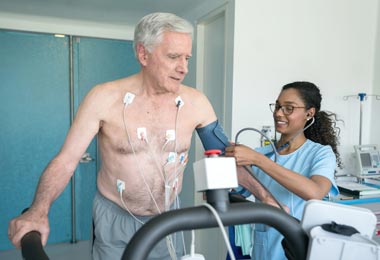Frequently Asked Questions About Pacemakers and Implantable Cardioverter Defibrillators (ICDs)
Do cell phones interfere with pacemakers or ICDs?
Cell phones available in the U.S. (less than 3 watts) do not appear to interfere with or damage pacemakers. However, it's best to avoid keeping your cell phone in your breast pocket on the side of the device. And, use the phone on the opposite ear, as well.
Do pacemakers or ICDs need to be adjusted periodically?
Some devices may need to be adjusted if your medical condition or lifestyle changes. Most adjustments are done using a device called a programmer. This is a specialized computer that communicates with the pacemaker or ICD using magnetic signals via a "wand" or loop placed over your chest where the device is implanted. Your doctor will instruct you about the schedule of follow-up visits you should keep based on your condition and type of device. You may have an assessment using a monitor and telephone line or an internet connection on a periodic basis. Most current ICDs and some pacemakers can now be followed remotely. This means the device can wirelessly transmit data to your doctor.
When replacing a pacemaker or ICD, are the leads also replaced?
If the original leads are working properly, in most cases, they will be left in place and reattached to the new device.
When do I have to replace my pacemaker or ICD?
Most device batteries will last at least 5 to 7 years, depending on use. After that time, the battery or pulse generator will need to be replaced. Replacing a pacemaker generator may be done on an outpatient basis or may include an overnight stay in the hospital.
Can I travel with my pacemaker or ICD?
Yes, you can travel by air with your device and drive a car, if cleared by your doctor. Airport security detectors are generally safe, but let airport security staff know you have a pacemaker/ICD and discuss the appropriate screening procedure. If selected to be screened by handheld wand, politely remind the screener that these wands should not be held over the device area for more than a few seconds. You should be sure to always have your identification card with you wherever you go. Some people with ICDs may not be allowed to drive unless cleared by their doctor. For your safety, and the safety of others, your doctor may recommend that you do not drive for 6 months after your ICD is implanted, or after an ICD discharge. The life threatening heart arrhythmias that these devices treat can cause you to lose consciousness, which is dangerous if your are driving.
Can I exercise with a pacemaker?
You may be able to exercise with your pacemaker or ICD, but check with your doctor first to make sure the form of exercise you do will not damage the device.
Will I feel the pacemaker or ICD?
At first, you may feel the weight of the device in your chest. But, over time, most people get used to it. The device generator is very small, about the size of two small silver dollars stacked on top of each other, and weighs about an ounce or less, depending on the make and model of the device. ICDs are typically slightly larger than a pacemaker. If the device feels loose or wiggles in the pocket under the skin, report this to your healthcare provider. Excessive movement can cause a detachment of the generator from the wires, or the wires from the heart muscle, and the device will not work properly. If the ICD sends a shock to the heart or "fires," you will feel this as a jolt or kick in the chest.
Sometimes the placement of the ICD wires can stimulate nerves that cause the diaphragm to twitch of the diaphragm and nonstop hiccups or twitching of the chest muscles. If this happens, call your healthcare provider.
Can I have an MRI with my pacemaker or ICD?
When you have a pacemaker implanted, stay away from devices with large magnets or magnetic fields that can be created from motors of cars or boats. An MRI is a diagnostic imaging tool used to take images of your body using magnets. Some pacemaker and ICD devices are approved to have an MRI but always talk with your provider before having this test to make sure it is safe for you. Magnetic fields can be created by other machines which could affect the normal function of your device. Avoid high-voltage radar machines, such as radio or T.V. transmitters, electric arc welders, high-tension wires, radar installations, or smelting furnaces.


.png?h=244&iar=0&mh=260&mw=380&w=220&hash=F7A00D85879A825944F9A1DE38075C5F)
